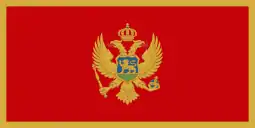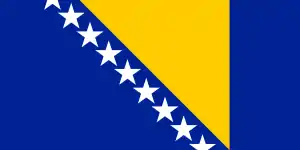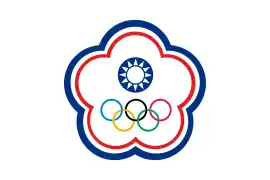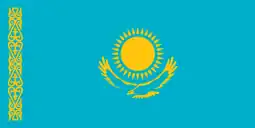FK Spartak Subotica
Fudbalski klub Spartak Subotica (Serbian Cyrillic: Фудбалски клуб Спартак Суботица) is a professional football club from Subotica, Serbia, that plays in the Serbian SuperLiga.
 | |||
| Full name | Fudbalski klub Spartak Subotica | ||
|---|---|---|---|
| Nickname(s) | Golubovi (The Pigeons) | ||
| Founded | 21 April 1945 | ||
| Ground | Subotica City Stadium, Subotica | ||
| Capacity | 13,000 | ||
| President | Dragan Simović | ||
| Head coach | Vladimir Buač | ||
| League | Serbian SuperLiga | ||
| 2019–20 | Serbian Superliga, 7th | ||
| Website | Club website | ||
|
| |||
| Active sport clubs of Spartak Subotica | ||||||||||||
|---|---|---|---|---|---|---|---|---|---|---|---|---|
|
The club was founded in 1945 and was named after Jovan Mikić Spartak, the leader of the Partisans in Subotica, who was a national hero and was killed in 1944.
The club was named Spartak Subotica until the end of the 2007–08 Serbian League Vojvodina season when it was merged with Zlatibor Voda who won promotion to the Serbian First League thus gaining the name Spartak Zlatibor Voda. In 2013, the board decided to return the original name of the club: "FK Spartak Subotica." However, the practice of adopting a sponsorship name returned in 2018 with the club accepting sponsorship from a vinary and renaming itself Spartak Ždrepčeva krv after the name of the popular wine brand produced in Serbia.
Some famous players to have represented the club over its history include : Nemanja Vidic who would go on to become a Manchester United legend, Nikola Zigic who would go on to play successfully in Spain and England, Ognjen Koroman who would go on to play for Serbia/Montenegro at the 2006 FIFA World Cup and forge a successful career across Europe, Andrija Kaluđerović who would play in many countries across the world and club legend Vidak Bratic who represented the club on numerous occasions.
History
Origins
Founded in 1945, FK Spartak Subotica is, after Vojvodina, the most successful club in northern Serbia. They participated in the first after-war club championship, in the 1946–47 Yugoslav First League and from then on, they played always in between the first and second national leagues. The biggest success of the club was achieved when the club played in the 1993–94 FR Yugoslavia Cup final against Partizan (1–6 loss).
However, football in Subotica has long tradition. During the pre-WWII period, the city was the seat of the Subotica Football Subassociation, one of the subassociations which existed within the Yugoslav Football Association, and which organised league competitions whose winners qualified for the Yugoslav championship where the national champion was decided. Subotica was home to 3 major clubs that made it to the Yugoslav championship before 1941: Bačka, SAND and ŽAK Subotica. Bačka has further more the record of being the oldest football club in the entire territory of former Yugoslavia.
When Second World War started in 1941 in Yugoslavia, Subotica was invaded by the Axis forces and incorporated into Hungary with its clubs being included in the Hungarian league system. At the end of the war Yugoslavia took control again of Subotica. Some clubs such as SAND were dissolved, others like Bačka kept existing although played a much lesser role from then on, and, some new were formed, like Radnički or Građanski. ŽAK Subotica kept being active for a while, however, their main sponsor, the Yugoslav Railways, decided to dissolve it and form a new club in its place which would be named "Spartak" which was the nickname of a legendary athlete from Subotica and World War II Yugoslav Partisans commander Jovan Mikić – Spartak. Besides the players, the stadium, the colors and the fans, Spartak also inherited from ŽAK the tradition of being backed by the Yugoslav Railways.[1]
1946 to 2006
During the period of socialist Yugoslavia, Spartak was a regular participant either in Yugoslav First or Second leagues. Although never won thee national championship, they were a feared adversary known for both, producing good homeground players that archived quality careers domestically and abroad, and also bringing talented players from regions all around Yugoslavia. Spartak also contributed with a number of players for the national team. During this period, the highlight was their presence as losing finalist of the 1961–62 Yugoslav Cup.
Spartak was cup finalist again, in the 1993–94 FR Yugoslavia Cup. By then the old SFR Yugoslavia broke-up and FR Yugoslavia formed by Serbia and Montenegro took its place. Spartak was a regular participant of the First League of FR Yugoslavia all way until 1999–2000 season when they were relegated and a period of crisis started.
During the first decade of the new millennium the club went downhills all way until 2008 when they merged with FK Zlatibor Voda from neighbouring town of Horgoš. Playing under the name FK Spartak Zlatibor Voda, the club started recouvering finally reaching its come-back to top tier when they promoted to the 2009–10 Serbian SuperLiga.
2006 till nowadays
Spartak’s biggest success since Serbia restored its name as country in 2006, came in the 2018–19 UEFA Europa League qualifying rounds. They first defeated Northen Irish club Coleraine F.C. in Round 1, then went on to achieve what is considered their brightest moment in club history defeating Czech powerhouse AC Sparta Prague over two legs. They would eventually be eliminated from the UEFA Europa League in the 3rd qualifying round losing to Danish club Brøndby IF over two leagues.[2]
Supporters
Spartak's fans are known as Marinci (Marines), which were formed in early 1989.
Stadium
Subotica City Stadium (Gradski stadion[3]) is a multi-use stadium in Subotica, Serbia. It is currently used mostly for football matches and is the club's home ground since 1945. The stadium holds 13,000 people. There is a football pitch and a registered track for athletics suitable for competitions. One part of the Stadium is covered. There are also two subsidiary football pitches.
Spartak in Europe
Mitropa Cup
The Mitropa Cup, officially called the La Coupe de l'Europe Centrale, was one of the first really international major European football cups that the club participated in. After World War II, in 1951, a replacement tournament named Zentropa Cup was held to resume the rich tradition of this competition.
| Season | Contest | Round | State | Club | Score | Place |
|---|---|---|---|---|---|---|
| 1987 | Mitropa Cup | semi-finals | Ascoli | 1–2 | Ascoli | |
| 3./4. place | Vasas | 0–2 | Porto Sant'Elpidio | |||
UEFA competitions
- Qualified for Europe in 2 seasons
| Season | Competition | Round | Club | Home | Away | Aggregate |
|---|---|---|---|---|---|---|
| 2010–11 | Europa League | QR2 | 2–0 | 3–3 | 5–3 | |
| QR3 | 2–1 | 0–2 | 2–3 | |||
| 2018–19 | Europa League | QR1 | 1–1 | 2–0 | 3–1 | |
| QR2 | 2–0 | 1–2 | 3–2 | |||
| QR3 | 0–2 | 1–2 | 1–4 |
Honours
National Championships – 1
- People's Republic of Serbia League (Vojvodina group)
- Winners (1): 1945–46[4]
Players
For recent transfers, see List of Serbian football transfers summer 2020.
Current squad
Note: Flags indicate national team as defined under FIFA eligibility rules. Players may hold more than one non-FIFA nationality.
|
|
Players with multiple nationalities

 David Dunđerski
David Dunđerski
 Stefan Denković
Stefan Denković
 Aleksandar Vidović
Aleksandar Vidović
 Vladan Vidaković
Vladan Vidaković
Out on loan
Note: Flags indicate national team as defined under FIFA eligibility rules. Players may hold more than one non-FIFA nationality.
|
Notable players
- To appear in this section a player must have either:
- Played at least 80 games for the club.
- Set a club record or won an individual award while at the club.
- Played at least one international match for their national team at any time.
 Milan Jovanić
Milan Jovanić Andrija Kaluđerović
Andrija Kaluđerović Dejan Kekezović
Dejan Kekezović Ognjen Koroman
Ognjen Koroman Zoran Ljubinković
Zoran Ljubinković Predrag Mijić
Predrag Mijić Igor Popović
Igor Popović Dejan Rončević
Dejan Rončević Vojo Ubiparip
Vojo Ubiparip Vladimir Veselinov
Vladimir Veselinov Nemanja Vidić
Nemanja Vidić Nikola Žigić
Nikola Žigić.svg.png.webp) Miloš Cetina
Miloš Cetina.svg.png.webp) Zvonko Ćirić
Zvonko Ćirić.svg.png.webp) Zoran Dimitrijević
Zoran Dimitrijević.svg.png.webp) Milorad Đukanović
Milorad Đukanović.svg.png.webp) Miloš Glončak
Miloš Glončak.svg.png.webp) Lajoš Jakovetić
Lajoš Jakovetić.svg.png.webp) Gojko Janjić
Gojko Janjić.svg.png.webp) Senad Karač
Senad Karač.svg.png.webp) Zoltan Kujundžić
Zoltan Kujundžić.svg.png.webp) Zoran Kuntić
Zoran Kuntić.svg.png.webp) Slobodan Kustudić
Slobodan Kustudić.svg.png.webp) Ranko Leškov
Ranko Leškov.svg.png.webp) Dušan Maravić
Dušan Maravić.svg.png.webp) Dragan Miranović
Dragan Miranović.svg.png.webp) Tihomir Ognjanov
Tihomir Ognjanov.svg.png.webp) Bela Palfi
Bela Palfi.svg.png.webp) Antal Puhalak
Antal Puhalak.svg.png.webp) Zvonko Rašić
Zvonko Rašić.svg.png.webp) Antun Rudinski
Antun Rudinski.svg.png.webp) Živko Slijepčević
Živko Slijepčević.svg.png.webp) Dimitrije Stefanović
Dimitrije Stefanović.svg.png.webp) Miloš Stojiljković
Miloš Stojiljković.svg.png.webp) Slobodan Šujica
Slobodan Šujica.svg.png.webp) Jožef Takač
Jožef Takač.svg.png.webp) Antal Tapiška
Antal Tapiška.svg.png.webp) Tomislav Taušan
Tomislav Taušan Tim Chow
Tim Chow Ivo Šeparović
Ivo Šeparović Dejan Antonić
Dejan Antonić Zsombor Kerekes
Zsombor Kerekes István Nyers
István Nyers Flórián Urbán
Flórián Urbán Maxim Fedin
Maxim Fedin Nikola Drinčić
Nikola Drinčić Vladimir Jovović
Vladimir Jovović Mladen Kašćelan
Mladen Kašćelan Nemanja Nikolić
Nemanja Nikolić Savo Pavićević
Savo Pavićević Milan Purović
Milan Purović Janko Tumbasević
Janko Tumbasević Nikola Vujović
Nikola Vujović
For the list of all current and former players with Wikipedia article, please see: Category:FK Spartak Subotica players.
Managers
.svg.png.webp) Ilija Rajković (19??–60)[8]
Ilija Rajković (19??–60)[8].svg.png.webp) Tihomir Ognjanov
Tihomir Ognjanov.svg.png.webp) Milan Živadinović (1974–1975)
Milan Živadinović (1974–1975).svg.png.webp) Ljupko Petrović (Jan 7, 1987 – July 1, 1988)
Ljupko Petrović (Jan 7, 1987 – July 1, 1988)%253B_Flag_of_Serbia_and_Montenegro_(2003%E2%80%932006).svg.png.webp) Milutin Sredojević (July 1, 2000 – June 30, 2001)
Milutin Sredojević (July 1, 2000 – June 30, 2001).svg.png.webp) Ranko Popović (July 1, 2008 – June 30, 2009)
Ranko Popović (July 1, 2008 – June 30, 2009).svg.png.webp) Zoran Milinković (July 1, 2009 – June 30, 2010)
Zoran Milinković (July 1, 2009 – June 30, 2010) Dragan Miranović (July 1, 2010 – Nov 14, 2010)
Dragan Miranović (July 1, 2010 – Nov 14, 2010) Ilija Dobrić (caretaker) (Nov 14, 2010 – Dec 17, 2010)
Ilija Dobrić (caretaker) (Nov 14, 2010 – Dec 17, 2010) Ljubomir Ristovski (Dec 17, 2010 – June 3, 2011)
Ljubomir Ristovski (Dec 17, 2010 – June 3, 2011) Zoran Njeguš (7 June 2011 – 3 Feb 2012)
Zoran Njeguš (7 June 2011 – 3 Feb 2012) Zoran Milinković (Feb 6, 2012 – Sept 3, 2012)
Zoran Milinković (Feb 6, 2012 – Sept 3, 2012) Zoran Marić (Sept 4, 2012 – Sept 8, 2012)
Zoran Marić (Sept 4, 2012 – Sept 8, 2012) Petar Kurćubić (Sept 10, 2012 – 1 Oct 1, 2013)
Petar Kurćubić (Sept 10, 2012 – 1 Oct 1, 2013) Dragi Kanatlarovski (Oct 1, 2013 – June 2, 2014)
Dragi Kanatlarovski (Oct 1, 2013 – June 2, 2014) Stevan Mojsilović (June 2, 2014 – Oct 23, 2015)
Stevan Mojsilović (June 2, 2014 – Oct 23, 2015) Andrey Chernyshov (Oct 31, 2015 – May 31, 2017)
Andrey Chernyshov (Oct 31, 2015 – May 31, 2017) Aleksandar Veselinović (June 5, 2017 – Apr 8, 2018)
Aleksandar Veselinović (June 5, 2017 – Apr 8, 2018) Vladimir Gaćinović (Apr 9, 2018 – Oct 1, 2018)
Vladimir Gaćinović (Apr 9, 2018 – Oct 1, 2018) Predrag Rogan (Oct 2, 2018 – June 6, 2019)
Predrag Rogan (Oct 2, 2018 – June 6, 2019) Vladimir Gaćinović (June 6, 2019 – November 20, 2020)
Vladimir Gaćinović (June 6, 2019 – November 20, 2020) Vladimir Buač (November 20, 2020—present)
Vladimir Buač (November 20, 2020—present)
Kit manufacturers and shirt sponsors
References
- gradsubotica.co.rs (in Serbian)
- "Spartak se odbranio i srušio Spartu!". b92.net (in Serbian). 2 August 2018. Retrieved 18 August 2020.
- FK Spartak ZV Archived 22 April 2012 at the Wayback Machine at srpskistadioni.in.rs
- "Champions 1946". crvenazvezdafk.com. Retrieved 9 May 2018.
- "First Team". FK Spartak Subotica official website. Retrieved 10 July 2018.
- "Licensed for UEFA Europa League". UEFA. Retrieved 10 July 2018.
- "Licensed for the Serbian SuperLiga". superliga.rs. Retrieved 25 July 2018.
- Od Zone do Zone by Radiša Dragićević, page 37 (in Serbian)
External links
- Official website (in Serbian)
- Blue Marines fans
- Club profile and squad at Srbijafudbal
- Club history at Sportski savez Subotice (in Serbian)
- Spartak Stats at Utakmica.rs